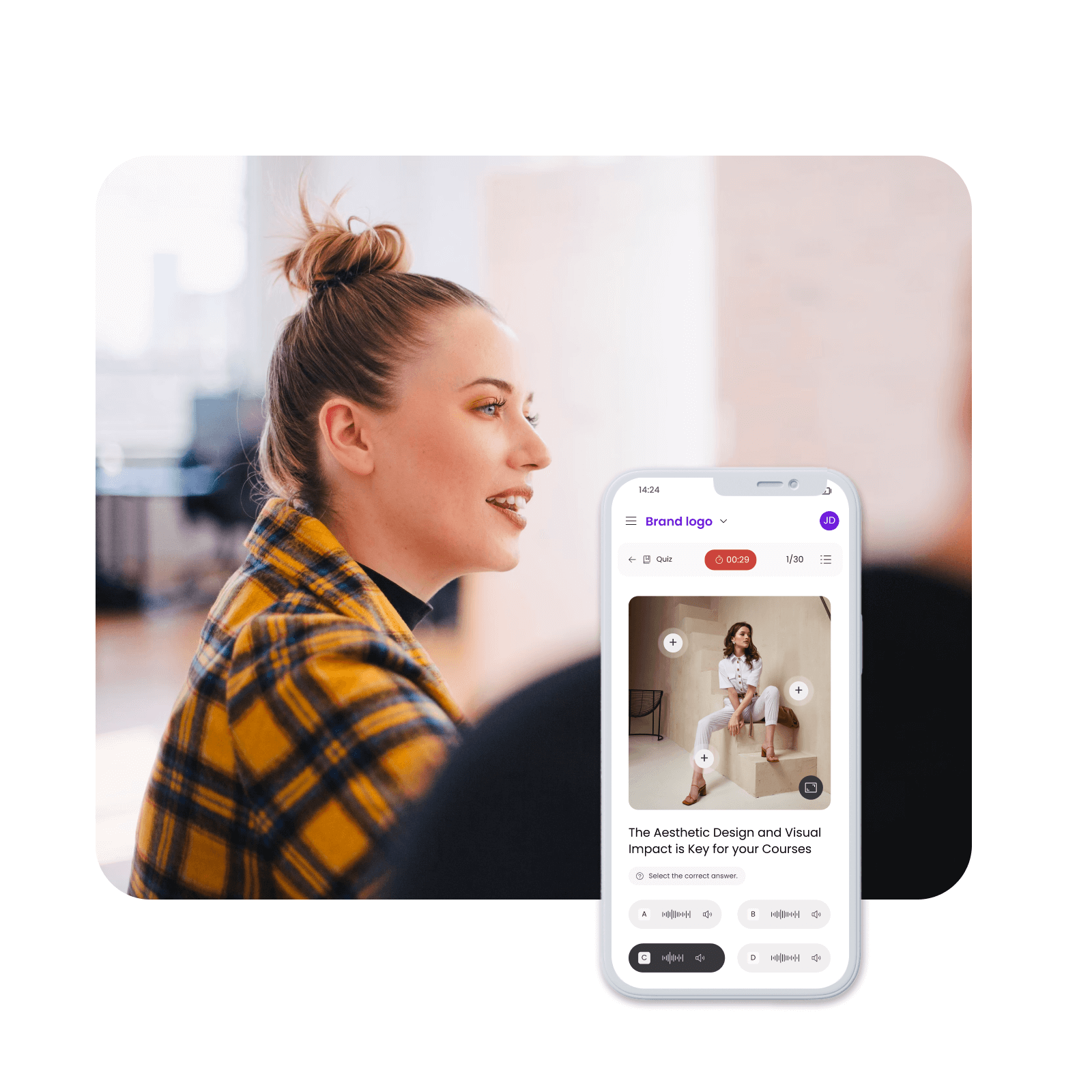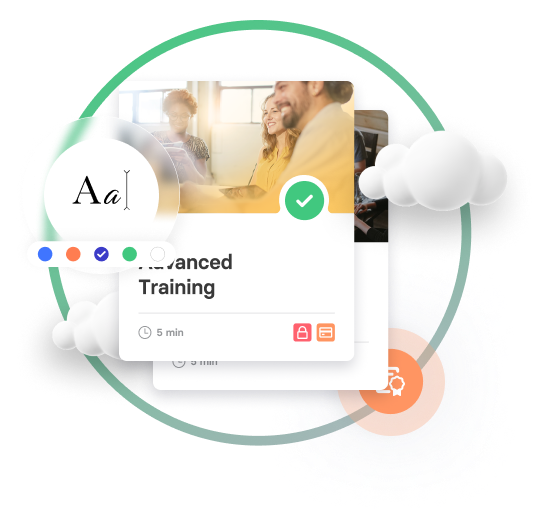9 E-Learning retail Innovations
9 eLearning retail Innovations to Watch in 2025
The eLearning retail sector is on the cusp of transformative innovations in 2025, underscoring a dynamic evolution that pivots from traditional interaction-based methods to immersive video quiz experiences.
This year, retailers are leveraging cutting-edge eLearning technologies to create engaging, interactive training modules that not only educate but also entertain, significantly enhancing the learning experience.
The advent of AI-driven personalised learning paths and augmented reality (AR) simulations for hands-on practice in virtual environments are key trends revolutionising how retail employees acquire skills and knowledge.
Gamified learning experiences are becoming more sophisticated, incorporating real-time feedback and competitive elements to motivate learners.
The shift towards video quizzes, incorporating interactive elements directly within video content, is particularly noteworthy.
This approach not only captivates learners but also reinforces knowledge retention by making learning an active rather than passive experience.
As these innovations gain momentum, the eLearning landscape in the retail sector is quickly evolving into a more immersive, efficient, and effective environment for workforce development, setting a new standard for how retail professionals are trained and how they perform on the job.
1. Artificial Intelligence (AI) for retail training
Artificial Intelligence (AI) in retail training represents a paradigm shift, particularly in enhancing creativity and productivity within the realm of copywriting.
By leveraging AI-driven tools, retail professionals can refine their copywriting skills through personalized feedback and suggestions that improve clarity, engagement, and effectiveness of their content.
These AI systems can analyze vast amounts of data to identify successful writing patterns and trends, helping copywriters benchmark their work against high-performing content in similar retail contexts.
AI can assist in generating relevant questions and content ideas from provided information, stimulating creative thinking and encouraging a deeper understanding of the subject matter.
2. Artificial Intelligence and Personalisation for online retail training
AI-driven platforms are revolutionising training by enabling personalised learning experiences that adapt to each employee’s skills, progress, and learning pace.
With adaptive learning paths, these platforms adjust content based on individual performance, preferences, and knowledge gaps, ensuring more efficient and targeted training.
A key component of this transformation is the AI chatbot, which acts as a virtual learning assistant, providing instant answers, tailored recommendations, and real-time feedback. These intelligent chatbots help employees navigate training modules, clarify doubts, and reinforce learning through interactive, on-demand support.
By integrating AI-driven personalization, companies can ensure that employees receive engaging, relevant, and optimized training experiences, boosting both knowledge retention and on-the-job performance.
3. Nano and Microlearning for online retail training
Nano and Microlearning have become essential methodologies in retail training, catering to the unique needs of a fast-paced and dynamic industry. Retail employees often face time constraints, balancing customer service with the need for ongoing professional development.
Nano and microlearning address this challenge by breaking down complex training content into small, manageable units that can be consumed in just a few minutes.
This approach not only fits seamlessly into the busy schedules of retail staff but also promotes continuous learning by making it easier to digest new information and apply it immediately on the job.
These bite-sized learning experiences can be accessed on-demand, enabling learners to fill knowledge gaps or acquire new skills right at the moment of need.
4. Interactive Video Learning for online retail training
Videos are no longer just one-way content delivery tools—they are evolving into interactive learning experiences that actively engage learners.
By integrating embedded questions, clickable hotspots, and branching scenarios, training videos now encourage real-time participation, decision-making, and personalised learning paths.
These interactive elements transform videos from passive consumption into dynamic, hands-on training tools, allowing learners to apply knowledge, receive immediate feedback, and explore customised scenarios based on their choices.
This shift enhances knowledge retention, engagement, and practical application, making video-based learning more immersive, adaptive, and effective across industries like fashion, retail, corporate training, and beyond.
5. Video Quizzes for online retail training
Video quizzes are transforming learning by enabling real-time assessment and instant feedback, making training more interactive and effective.
Instead of passively watching content, learners engage with embedded quiz questions at key moments, ensuring they actively process and apply the information.
These quizzes provide immediate feedback, reinforcing correct answers while clarifying misunderstandings, helping learners retain knowledge more effectively.
By integrating adaptive questioning and performance tracking, video quizzes personalise the learning experience, allowing educators and trainers to identify knowledge gaps and adjust training accordingly.
This innovative approach enhances engagement, comprehension, and retention, making video-based learning a more dynamic and results-driven tool.
6. The Rise of Social Learning Platforms in Retail Training
Learning platforms that facilitate social learning and collaboration among retail employees are transforming the way teams acquire and share knowledge.
These tools enable peer-to-peer learning, discussion forums, and real-time collaboration, allowing employees to exchange best practices, product insights, and customer service strategies effortlessly.
By integrating interactive features like group chats, live Q&A sessions, and shared learning spaces, these platforms foster a sense of community and collective problem-solving.
This approach not only enhances engagement and knowledge retention but also creates a continuous learning culture, where employees actively contribute to one another’s development, keeping pace with evolving retail trends and customer expectations.
7. Peer to Peer for online retail training
Peer-to-peer learning in online retail training offers a multitude of benefits, fostering an engaging and collaborative learning environment that extends beyond traditional training methods.
This approach leverages the collective knowledge and experiences of employees, allowing them to share insights, best practices, and real-world solutions to common challenges faced in the retail sector.
Peer-to-peer learning encourages active participation and deepens understanding by exposing employees to diverse perspectives and strategies. It accelerates learning as employees can immediately apply practical advice and tips from their colleagues, leading to faster problem-solving and innovation.
8. Mobile Learning for online retail training
With the ubiquity of smartphones, mobile learning has become a game-changer for retail training, offering anytime, anywhere access to learning materials.
This flexibility is especially valuable for retail employees, allowing them to access training modules, product updates, and customer service guidelines on-the-go or directly at the point of need within the store.
Whether reviewing styling techniques, sales strategies, or new inventory details, mobile learning ensures that staff can quickly upskill without disrupting their workflow.
By providing on-demand, bite-sized content, mobile learning enhances engagement, retention, and real-time problem-solving, making it an essential tool for a fast-paced retail environment.
9. Analytics and Learning Insights
Advanced analytics tools are providing deeper insights into learning patterns, effectiveness, and outcomes.
Retail organisations can use this data to make informed decisions about training strategies, content optimisation, and identifying areas where employees may need additional support.
Conclusion
These innovations are not just changing how retail employees are trained but are also significantly improving the quality of customer service and operational efficiency.
As eLearning technologies continue to evolve, they promise to bring about even more exciting developments in the years to come.
Simplify Learning,
Elevate Design.
IMAGINE. CREATE. CRAFT. INNOVATE. LEARN.





